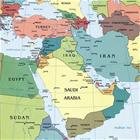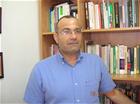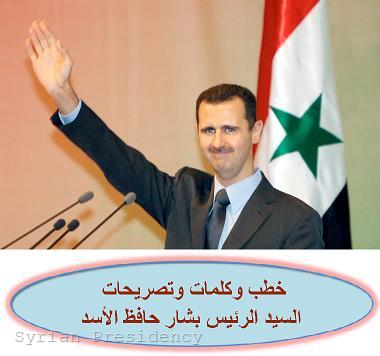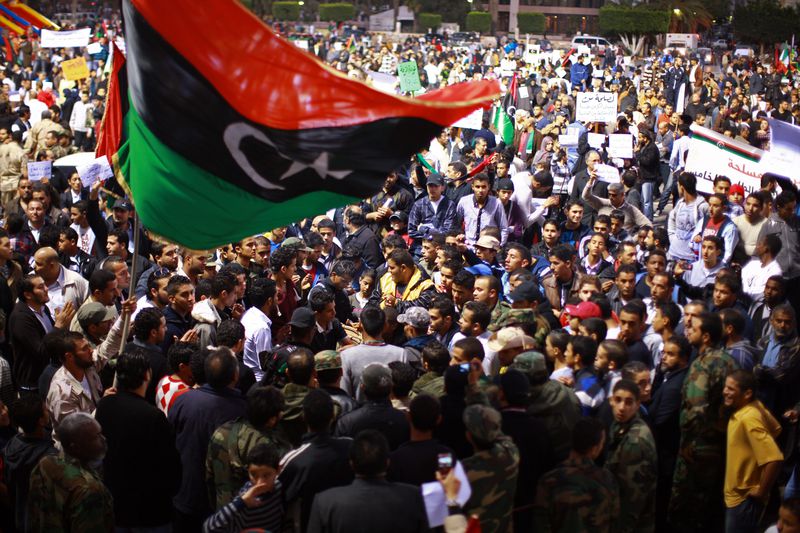The West Should Be Identifying the Democratic Alternatives in the Middle East
Dragomir Ivanov, August 20, 2012
 A month ago Bulgaria experienced a terrorist attack that took it out of the provincial sense of bliss that the global terrorism will bypass its lands. The 18 July assault in Bourgas shocked not only the country but half of the world to make them stare even more horror-stricken at the Middle East where for a year and a half the situation has been turbulent. The assault against Israeli tourists and the death of a Bulgarian bus driver of Islam religion was put in the context of the escalation of developments around Iran. Right after the assault, official Israeli representatives put the blame on Tehran and the radical Lebanon group Hezbollah that it supports. Iran did not remain silent and pointed out in their turn – through a statement of its UN Ambassador Mohammad Khazaee in the Security Council – that Israel alone organised the assault at Sarafovo airport.
A month ago Bulgaria experienced a terrorist attack that took it out of the provincial sense of bliss that the global terrorism will bypass its lands. The 18 July assault in Bourgas shocked not only the country but half of the world to make them stare even more horror-stricken at the Middle East where for a year and a half the situation has been turbulent. The assault against Israeli tourists and the death of a Bulgarian bus driver of Islam religion was put in the context of the escalation of developments around Iran. Right after the assault, official Israeli representatives put the blame on Tehran and the radical Lebanon group Hezbollah that it supports. Iran did not remain silent and pointed out in their turn – through a statement of its UN Ambassador Mohammad Khazaee in the Security Council – that Israel alone organised the assault at Sarafovo airport.The smell of powder in the Middle East is not a news but this time the situation is charged with an extremely dangerous load to which the Bourgas bomb might play the role of a burning match-stick. Attempting to clarify the multiple dimensions of the Middle-East theatre and the effects of the explosion at Sarafovo airport, euinside contacted two influential experts on the Middle East to comment on the various aspects of the situation.
We present here the opinion of Ms Yehudit Barsky, Director of the Division on Middle East and International Terrorism at the influential American Jewish Committee.The Division monitors extremist organisations in the Middle East and publishes regularly reports on the situation in the region. Ms Barsky holds a master degree in international relations and Near Eastern studies from the New York University and is an associate scholar with the Foreign Policy Research Institute's Middle East Council. The second opinion is of Professor Uzi Rabi, Director of the Moshe Dayan Centre for Middle Eastern Studies at Tel Aviv University. He is a renowned expert in modern history of societies and politics in the region. Prof. Rabi regularly appears on national and international news programmes to comment on current events in the Middle East.
Yehudit Barsky: Tehran represents different kinds of threat for the Middle East and the world
euinside: Ms Barsky, a suicide bomber blew up a bus full of Israeli tourists at the Burgas Airport in Bulgaria. Some analysts say the attack, targeting civilians, is a landmark point in the situation because most of the foiled plots in the past were intended against 'hard targets', like Israeli embassies/institutions abroad. Who has the biggest interest in this assassination?
tourists at the Burgas Airport in Bulgaria. Some analysts say the attack, targeting civilians, is a landmark point in the situation because most of the foiled plots in the past were intended against 'hard targets', like Israeli embassies/institutions abroad. Who has the biggest interest in this assassination?
Yehudit Barsky: Over the past six months, there have been attempted attacks against Israeli and Western diplomatic missions throughout the world that have been linked to Iran and its surrogates. These include the Al-Quds Force of Iran's Islamic Revolutionary Guards, and Hezbollah, as well as sympathisers and recruits to their cause. With regard to the types of targets that they have chosen, there have also been previous attempts to attack "soft targets" such as synagogues and Jewish schools. One of the foiled plots to attack a synagogue occurred in Kenya earlier this month. An earlier foiled plot targeting the rabbi and a teacher at a Jewish school in Azerbaijan occurred in January of this year. The attack in Bourgas similarly took advantage of a "soft target" of Israeli tourists visiting Bulgaria. Unfortunately, the difference this time is that the attack was carried out.
euinside: To what extent is it a failure of Israeli intelligence? And what does it mean for the Bulgarian secret services and their reliability in front of the Western security and counter-terrorism community?
Yehudit Barsky: I really cannot say what Israel was or was not aware of prior to this attack as I do not have knowledge of Israeli intelligence activities. This was a very sophisticated attack which Bulgaria has never experienced before. It should be noted that the Bulgarian government responded to the attack by swiftly initiating an investigation to discover the perpetrators of the attack, and Western intelligence agencies and Israel have offered their support. What remains important now is the continued cooperation and coordination of the Bulgarian, Israeli and Western counter-terrorism communities to investigate the attack and to prevent future attacks that may be planned in Bulgaria or in other countries.
euinside: The Israeli PM Benjamin Netanyahu blamed Tehran and Hezbollah for the attack, Iran has denied any involvement. What are we seeing - a preparation for strike on Iran?
Yehudit Barsky: What we are seeing now regarding the previous foiled attacks and last week's attack in Bulgaria is Iran's reaction to the increased pressure that it is experiencing as the result of economic sanctions, particularly the new oil sanctions that went into effect recently, as well as the stalled negotiations with the P5+1 countries [the five permanent UN Security Council members US, China, Russia, Britain, France plus Germany]. As I mentioned earlier, the Israeli statements need to be understood in the context of Iranian involvement in previous attempted attacks. In those instances, Israeli government officials also publicly pointed out Iranian involvement. These public statements serve the purpose of putting Iran and Hezbollah and anyone who would cooperate with them on notice that they are being watched. These statements from Israeli PM Netanyahu, Defence Minister Barak and President Peres are being used as a warning to deter Iran and its surrogates from carrying out future attacks.
euinside: According to a publication in the Haaretz daily, Mr Netanyahu and the defence minister Barak are eager to deploy IDF forces on a mission targeting nuclear facilities in Iran. Do you expect such an escalation before the US presidential elections in November?
Yehudit Barsky: The article in the Haaretz is an opinion piece that I would not necessarily agree with, based on Israel's ongoing efforts to work together with the US and international community on the issue of Iran's efforts to acquire nuclear capability. Additionally, terrorism is an issue that is not the same type of security threat as nuclear capability. There is significant international cooperation that needs to be done on the counter terrorism front, as there are many countries that do not recognise the perpetrators of the recent attacks (Iran's Islamic Revolutionary Guards, its Al-Quds Force and Hezbollah) to be terrorist organisations. Both of these issues demonstrate that Iran poses different types of threats not just to the Middle East but to the world.
On the issue of Iran, seeking nuclear capability the most important two questions remain: Are the US and the international community doing anything to stop Iran from acquiring nuclear capability? And: Will the US and the international community do something about Iran's efforts before the window of opportunity closes to stop Iran from acquiring nuclear capability?
On both of these questions, there has been significant effort by the US and international community, which have resulted thus far in broad economic sanctions against Iran, as well as reports of the use of cyber weapons to slow Iran's production process. There have been conflicting media reports regarding exactly when Israel will consider the window of opportunity to stop Iran to be at a critical point. It may or may not occur around the time of the US presidential elections but the US elections will certainly be one of the political considerations that Israel takes into account concerning the timing of an effort to stop Iran.
euinside: It seems that the regime in Syria is in its last days. The opposition launched last month a large-scale battle for Damascus, meanwhile, major combat operations are taking place in the largest city Aleppo. And the international community appears not to be willing to intervene but rather wait and let the Syrians resolve the conflict on their own. Do you see a possibility for Assad to avoid Gaddafi's fate?
Yehudit Barsky: It appears that Bashar Assad has been offered several opportunities for asylum for himself and his family by his Arab allies but thus far it appears that he has not accepted any of their offers. He apparently believes that his Syrian army and his allies, including Iranian and Hezbollah snipers that work together with his military forces, will win the civil war and that he will maintain control over Syria or some part of it.
euinside: How will a change in Damascus affect the Arab-Israeli conflict and the behaviour of the radical Islamism actors like Iran and Hezbollah?
Yehudit Barsky: It will depend on whether Syria remains a nation state or becomes divided along religious and sectarian lines. Since the majority of the population in Syria are Sunni Muslims, it is likely that they will play a major role in the next Syrian government. There is also a significant presence of the Syrian Muslim Brotherhood in the Free Syria Army, which is a Sunni Islamist extremist movement. It is likely that the Syrian Muslim Brotherhood and other Sunni Islamists will play a strong post-Assad role because of their support for the Free Syria Army. Alternatively, and/or simultaneously, it is possible that Iran and Hezbollah will continue to support enclaves of Assad supporters and areas of the Alawite population. In all of these scenarios, Syria will remain an unstable country for the foreseeable future.
euinside: What do you regard as the main deficit of the Western (both US and European) approach to the Middle East and the so-called Arab Revolutions?
Yehudit Barsky: There is a misperception that organising an election campaign and holding elections automatically leads to democracy. Democracy is a system that has rules that must be taught as part of the values of civil society, an effort that takes a significant amount of time and effort. In the Middle East, anti-democratic parties such as Islamists seek to take advantage of elections for their own purposes. They claim to adhere to democratic values but after the first election they begin to erode the early infrastructure of democracy, and no longer hold elections, resulting in the phenomenon of a non-violent coup d'état carried out via democratic means. One person, one vote - but only one time.
Prof. Uzi Rabi: Netanyahu and Barak wish to strike Iran but without an open escalation
euinside: Prof. Rabi, who stands behind the assault in Bourgas?
 Prof. Rabi: I would guess that the Bourgas attack was an Iranian backed operation. I am not sure we can accurately say that Iran has been exclusively aiming at Israeli official targets rather than civilians. Opportunity and luck play a big part in these operations, and it may be possible that it was opportunity rather than deliberate escalation in the case of Bourgas. That said, it may be possible that Iran/Hezbollah has altered it tactics in favour of civilian targets rather than official targets for the simple reason of expediency: it may be easier to target civilians. I believe the Burgas attack is part of the Iran/Israel shadow war and that Iran is looking for ways to strike back at Israel for Israel's multi-pronged attacks on Iran's nuclear program (scientists, cyber war, border attacks through rebellious minorities).
Prof. Rabi: I would guess that the Bourgas attack was an Iranian backed operation. I am not sure we can accurately say that Iran has been exclusively aiming at Israeli official targets rather than civilians. Opportunity and luck play a big part in these operations, and it may be possible that it was opportunity rather than deliberate escalation in the case of Bourgas. That said, it may be possible that Iran/Hezbollah has altered it tactics in favour of civilian targets rather than official targets for the simple reason of expediency: it may be easier to target civilians. I believe the Burgas attack is part of the Iran/Israel shadow war and that Iran is looking for ways to strike back at Israel for Israel's multi-pronged attacks on Iran's nuclear program (scientists, cyber war, border attacks through rebellious minorities).
euinside: To what extent is the terrorism assault a failure of the Israeli intelligence?
Prof. Rabi: Sure, you might say Burgas was an intelligence failure. I believe that is an unfair judgement, however. It is impossible to stop every attack before it happens. Particularly attacks targeting Israeli tourists outside of Israel. What if Iran's next step is targeting non-Israeli Jewish communities outside of Israel? Is Israeli intelligence responsible for preventing those attacks as well? Open societies are vulnerable to terrorism. Even the most vigilant open-societies with the best intelligence services and international coordination are vulnerable to a well-planned, well-executed attack. The Burgas attack may not have been well-planned or well-executed but luck and surprise are often important elements of such attacks as well.
EU states have devoted considerable effort to facilitate travel across sovereign borders to promote trade and enhance employment opportunities. Terrorists are finding ways of taking advantage of this openness.
euinside: According to the Israeli PM Benjamin Netanyahu the involvement of Tehran is obvious. Iran categorically rejects any involvement. How do you interpret this kind of rhetoric, will there be really a strike on Iran?
Prof. Rabi: Netanyahu's post-Burgas statements were designed to serve strategic goals of maintaining consensus for continuing international isolation of Iran, and attempting to highlight a pattern of Iranian behaviour that disregards or flouts international norms. It may also have been part of attempt to prepare the public (Israeli and international) for an Israeli response.
euinside: Do you believe that Mr Netanyahu and the defence minister Barak will any moment now order a strike against the Iranian nuclear facilities?
Prof. Rabi: It's quite possible that if Netanyahu believes the strategic environment is as favourable as it is ever likely to be that he will order an attack on Iran, despite the potential for a coordinated regional military response against Israel from Iran and its allies and the possibility of broad international condemnation. I believe Netanyahu and Barak will make every effort to make it to November without an open escalation in the conflict, but it is hard to predict what might happen between Israel and Iran (overtly or covertly) between now and November. Further, if Iran takes steps to leap forward with its nuclear program the Israel may become more aggressive and less risk-averse.
euinside: To see the entire picture it is important to look at the situation in Syria. It seems that Bashar Asad’s regime is at the end of its forces but he is still holding up. Is it possible for Assad to escape the fate of Muammar Gaddafi?
Prof. Rabi: If there is no change from the international community I think we can expect the stalemate to continue in Syria. Assad still has enough military power to maintain a thin grip on power. The status quo can hold indefinitely if there is no change in the international community's posture and activities. I believe Assad will make every effort to avoid Gaddafi and Saddam's fate. Russia seems like a likely destination.
euinside: What will follow the end of his regime? And how will the change impact the Arab-Israeli conflict and the power projections of the radical Islam actors such as Iran, Hezbollah, the Hamas in Palestine and the Islamic Jihad?
Prof. Rabi: Syria is likely to be unstable for a long time to come. I doubt whatever follows Assad in Syria will be able to pursue much in the way of "power projection." It is possible that radical groups targeting Israel will use the instability in Syria to threaten Israel and carry out operations along Israel's border with Syria. These operations will be asymmetric and most likely use unconventional tactics and weapons, similar to Hizbullah in southern Lebanon and Hamas and other groups in Gaza and the Sinai.
euinside: What are the failures of the West’s approach to the Middle East and the so called Arab revolutions?
Prof. Rabi: In Syria and the post-uprising Arab states it appears that the West has not had enough money invested in civil society groups. You have to "pay to play" in the Middle East, and while the West paid to play with some of the regimes (Saleh, Mubarak) it has not had much influence with the civil society groups. Until the West begins throwing money at groups it feels that it can work with it will not be able to influence events going forward. The West can and should be identifying and supporting groups it feels may be viable alternatives to more radical religious organizations that appear to be gaining influence in the post-uprising chaos in the region. If there is no change from the international community I think we can expect the stalemate in Syria to continue. Assad still has enough military power to maintain a thin grip on power. The status quo can hold indefinitely if there is no change in the international community's posture and activities. I believe Assad will make every effort to avoid Gaddafi and Saddam's fate - which seems like a likely destination.
 | © Syrian Presidency
| © Syrian Presidency | © Présidence de la République @ L. Blevennec - P.
| © Présidence de la République @ L. Blevennec - P.  | © UN
| © UN